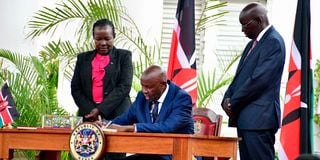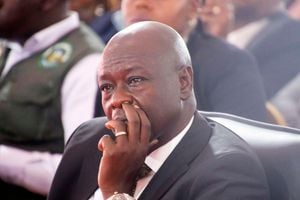Education ministry set to regain powers from TSC

Education Cabinet Secretary Ezekiel Machogu (centre) with Basic Education Principal Secretary Belio Kipsang and his Technical and Vocational Education and Training counterpart Esther Muoria during the signing of performance contracts at State House, Nairobi on august 1, 2023.
The Ministry of Education will regain immense powers if the recommendations of the Presidential Working Party on Education Reforms are fully implemented.
This will be at the expense of the Teachers Service Commission (TSC), which will be stripped of a number of responsibilities.
A silent conflict between the ministry and TSC has been laid bare in the report and is blamed for some of the challenges the basic education sector faces.
From the recommendations, TSC will lose the quality assurance function, which will revert to Jogoo House as it were before the commission was entrenched as a constitutional commission. Both offices have had quality assurance departments but with the one based in Jogoo House being understaffed and ill-equipped.
Equally, the commission will cede the role of training teachers to the ministry.
“Parallel roles and structures by the TSC and MoE jeopardised quality assurance and efficiency … the implementation of the competency-based curriculum (CBC) has been seriously hampered as a result of the perceived conflict of mandates between the Ministry of Education and its semi-autonomous government agencies and the TSC,” the report observes.
The task force further recommends that the teachers’ employer consults the ministry even in matters of teacher management.
“The manner in which TSC makes its independent decisions on deploying and redeploying teachers to public schools has created a challenge to the Ministry of Education’s capacity to superintend the effective execution of education policy, standards and curricula,” the report states.
It recommends that TSC, in consultation with the ministry, should harmonise teacher management guidelines on deployment, promotion of teachers and institutional administrators and teacher welfare.
The heads of institutions will now act as agents of the ministry and will be answerable to it. Initially, the ministry had to go through the commission in case it had any issues with school heads.
The commission has however retained its mandate to register teachers for all basic education levels. According to the report, at the pre-primary schools level, TSC registers qualified teachers but their recruitment, deployment, remuneration and welfare needs are devolved functions.
TSC, on average, consumes about three-quarters of the basic education budget. It remains the biggest employer in Kenya. Currently, there are 44,288 pre-primary education centres with 68,271 teachers. For primary schools, there are 223,296 teachers in 23,274 primary schools, but with a staff establishment of 267,792 teachers. This implies a shortage of 44,496 teachers.
There are 123,985 teachers in 9,246 secondary schools against a curriculum-based establishment of 182,566, implying a teacher shortage of 58,581.
TSC was also faulted for the way it promotes teachers.
“There was a general feeling that the TSC promotions are difficult to get beyond the common cadre promotions ... This has led to a large number of teachers stagnating in their job groups, especially in job group N or TSC Scale C5t,” the report reads.
The report also recommends that TSC offers all education graduates an opportunity to undertake a mandatory one-year internship programme upon completion of pre-service training. The internship should include induction, mentorship and coaching.





